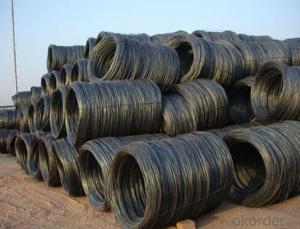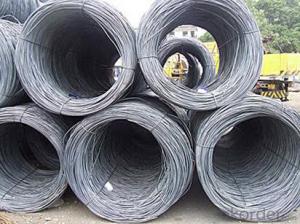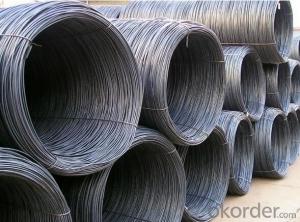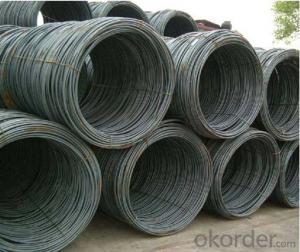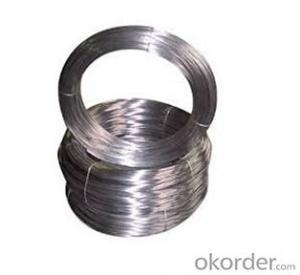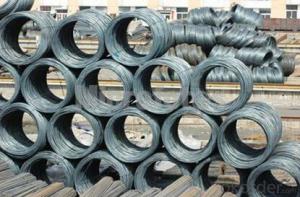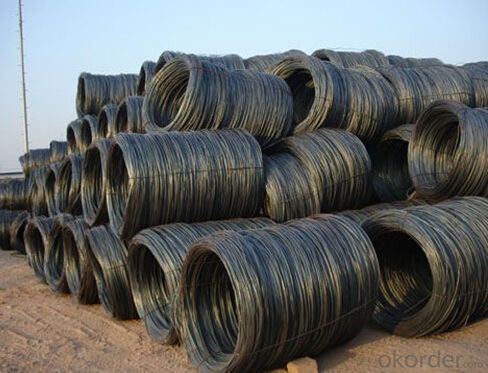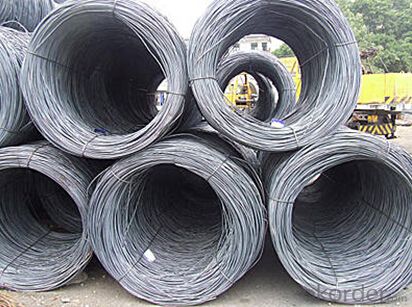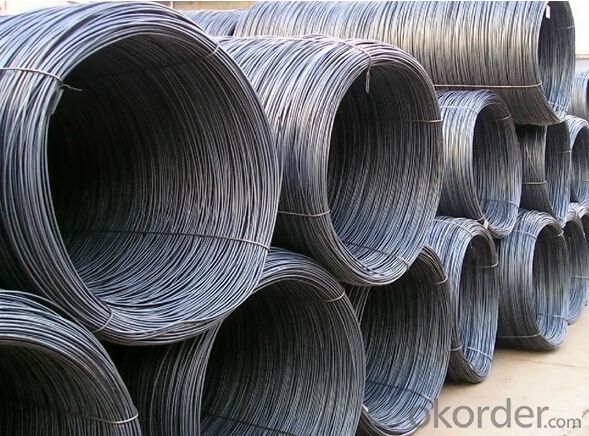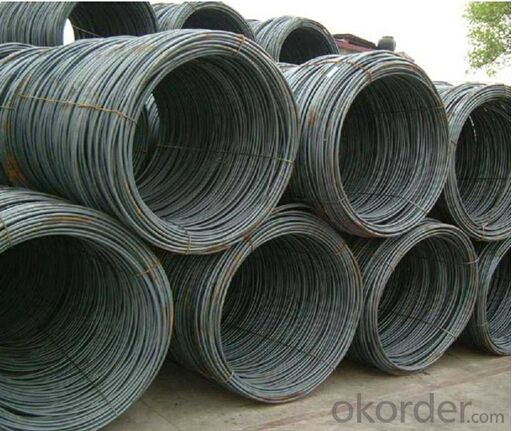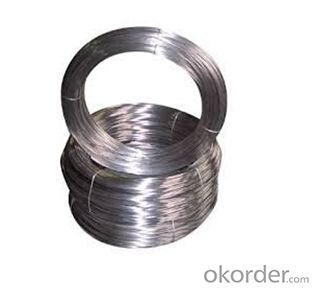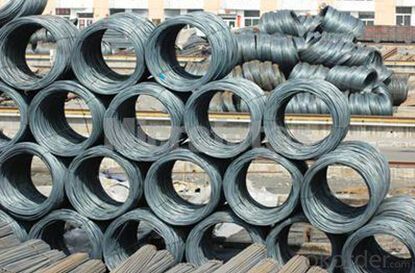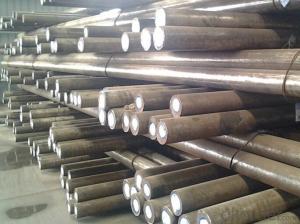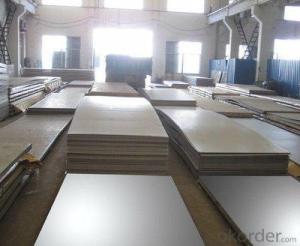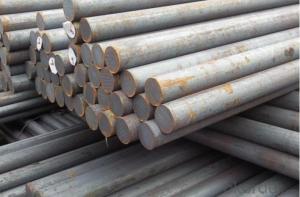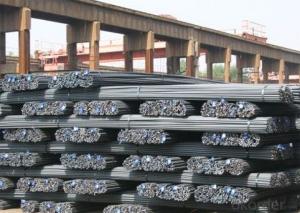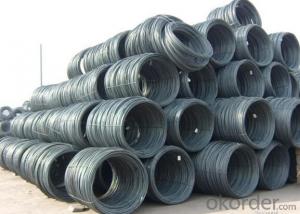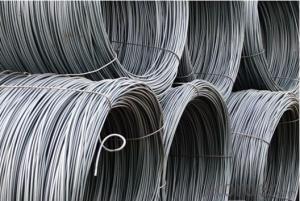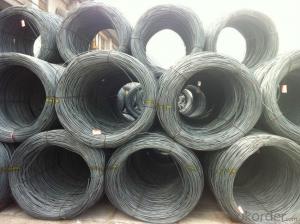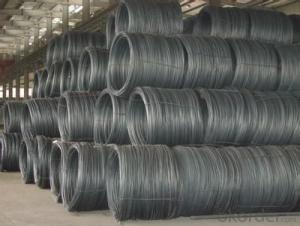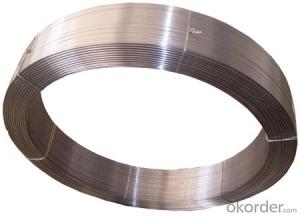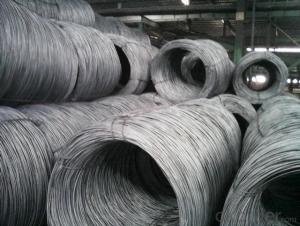m.s Wire Rod in Coils 5.5mm/6.5mm/8mm/10mm/12mm/16mm
- Loading Port:
- Tianjin
- Payment Terms:
- TT OR LC
- Min Order Qty:
- 10 m.t.
- Supply Capability:
- 10000 m.t./month
OKorder Service Pledge
OKorder Financial Service
You Might Also Like
Specification
m.s Wire Rod in Coils 5.5mm/6.5mm/8mm/10mm/12mm/16mm
Details of the m.s Wire Rod in Coils 5.5mm/6.5mm/8mm/10mm/12mm/16mm
| Steel Grade | Q195-Q235,Q235,SAE 1008-1018 Hot Rolled Steel Wire Rod |
| Diameter | 5.5, 6.5, 7,8, 9,10, 12,14mm.etc. |
| Coil weight | 2m.t. |
| Application | drawing, construction materials, machinery parts,construction for Houses, Bridges, Roads,Packing |
| Deliver Time | 25-30 days after receipt of L/C or deposit by T/T |
| Packing | In coils, loading in container or by bulk vessel |
| Payment terms | 1).100% irrevocable L/C at sight. |
| 2).30% T/T prepaid and the balance against the copy of B/L. | |
| 3).30% T/T prepaid and the balance against L/C |
| Chemical Composition(%) | ||||||
| C | Mn | Si | S | P | Cr | |
| SAE1006B | 0.03~O.07 | ≤0.32 | ≤0.30 | ≤0.045 | ≤0.040 | 0.3-0.35 |
| Mechanical properties | ||||||
| Yield strength(N/mm2) | Tensile strength(N/mm2) | Elongation(%) | ||||
| 250-280 | 350-380 | ≥32 | ||||
| Grade | Chemical Composition(%) | |||||
| C | Mn | Si | S | P | Cr | |
| SAE1008B | 0.10max | 0.3~O.50 | 0.15max | 0.050max | 0.040 max | 0.3-0.35 |
| Mechanical properties | ||||||
| Yield strength(N/mm2) | Tensile strength(N/mm2) | Elongation(%) | ||||
| ≥195 | 315-430 | ≥30 | ||||
Supplier of the m.s Wire Rod in Coils 5.5mm/6.5mm/8mm/10mm/12mm/16mm
CNBM International Corporation is the most import and export platform of CNBM group(China National Building Material Group Corporation) ,which is a state-owned enterprise, ranked in 270th of Fortune Global 500 in 2015.
With its advantages, CNBM International are mainly concentrate on Cement, Glass, Iron and Steel, Ceramics industries and devotes herself for supplying high quality series of refractories as well as technical consultancies and logistics solution.
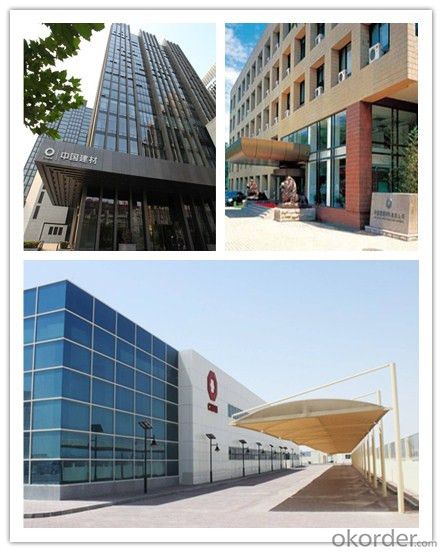
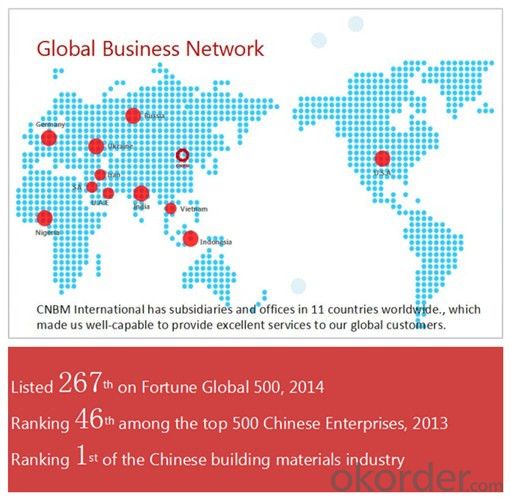
Delivery of the m.s Wire Rod in Coils 5.5mm/6.5mm/8mm/10mm/12mm/16mm
Packaging Detail | Sea worthy packing /as per customer's packing instruction |
Delivery Detail | 15 ~ 40 days after receiving the deposit |
Products Show
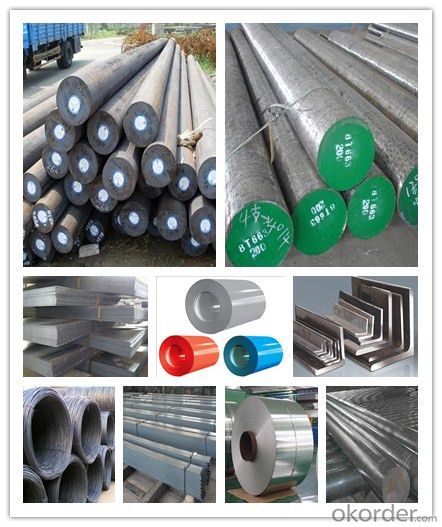
FAQ:
Are you a trading company or manufacturer? | Manufacturer |
What’s the MOQ? | 3 metric ton |
What’s your delivery time? | 15-35 days after downpayment received |
Do you Accept OEM service? | Yes |
what’s your delivery terms? | FOB/CFR/CIF |
What's the Payment Terms? | 30% as deposit,70% before shipment by T/T |
Western Union acceptable for small amount. | |
L/C acceptable for large amount. | |
Scrow ,Paybal,Alipay are also ok | |
Why choose us? | Chose happens because of quality, then price, We can give you both. Additionally, we can also offer professional products inquiry, products knowledge train (for agents), smooth goods delivery, excellent customer solution proposals. |
What's your available port of Shipment? | Main Port, China |
What’s your featured services? | Our service formula: good quality+ good price+ good service=customer's trust
|
Where are your Market? | Covering more than 160 countries in the world |
- Q: Can special steel be used in medical applications?
- Indeed, medical applications can utilize special steel. Known as stainless steel, special steel is extensively employed in the medical field due to its distinctive qualities and benefits. Its resistance to corrosion is exceptionally high, a crucial aspect in medical settings where exposure to bodily fluids and sterilization procedures is prevalent. Moreover, special steel is biocompatible, meaning it does not trigger adverse reactions upon contact with human tissues or fluids. Consequently, it finds suitability in numerous applications, including surgical instruments, orthopedic implants, dental equipment, and medical devices. The adaptability of special steel allows it to be molded into various forms, ensuring its utilization for diverse medical purposes. Furthermore, its strength and durability contribute significantly to its effectiveness in medical applications, providing dependable and long-lasting tools and equipment. Additionally, special steel can endure high temperatures, making it appropriate for autoclaving and other sterilization methods. In conclusion, the properties of special steel make it an exceptionally fitting material for medical applications, guaranteeing the safety, efficacy, and endurance of medical equipment and devices.
- Q: How does special steel perform in terms of corrosion resistance in acidic environments?
- Special steel, such as stainless steel, exhibits excellent corrosion resistance in acidic environments due to its high chromium content. The chromium forms a protective oxide layer on the surface of the steel, preventing the corrosive attack of acids. This makes special steel a reliable choice for applications where exposure to acidic environments is a concern.
- Q: Can special steel be used in the appliance manufacturing industry?
- Yes, special steel can be used in the appliance manufacturing industry. Special steel, also known as alloy steel, offers enhanced properties such as durability, corrosion resistance, and high temperature resistance. These qualities make it suitable for various appliance components, including heating elements, motor shafts, and structural parts.
- Q: How does special steel perform in forging applications?
- Special steel is highly valued in forging applications due to its remarkable strength, durability, and ability to withstand wear and tear. The exceptional properties of special steel, such as its high tensile strength, heat resistance, and resistance to corrosion, make it an ideal option for enduring the extreme conditions involved in forging processes. When exposed to the intense heat and pressure of forging, special steel maintains its structural integrity and mechanical properties. It can endure extreme temperature fluctuations without losing its hardness or becoming brittle, guaranteeing that the final forged product is of superior quality and reliability. Moreover, special steel offers excellent machinability and formability, enabling it to be easily shaped and manipulated during the forging process. This ease of working with special steel empowers manufacturers to create intricate and complex shapes, resulting in finely crafted forged components. Special steel also demonstrates exceptional resistance to fatigue and impact, making it highly suitable for applications that require high strength and toughness. It can endure repeated stress and load cycles without experiencing significant deformation or failure, ensuring the longevity and dependability of forged products. Additionally, special steel is renowned for its resistance to corrosion and oxidation, further enhancing its suitability for forging applications. It can withstand exposure to harsh environments, chemicals, and moisture, making it ideal for manufacturing components subjected to demanding operating conditions. Overall, special steel's outstanding performance in forging applications can be attributed to its high strength, durability, resistance to wear and tear, excellent machinability, and corrosion resistance. These properties establish it as a preferred choice in various industries, including automotive, aerospace, construction, and oil and gas, where reliable and efficient operations rely on high-quality forged components.
- Q: How does surface treatment affect the performance of special steel?
- Surface treatment plays a crucial role in enhancing the performance of special steel. The primary purpose of surface treatment is to alter the surface properties of the steel to meet specific requirements and improve its performance in various applications. One significant effect of surface treatment on special steel is increased corrosion resistance. By applying coatings or treatments such as galvanization, electroplating, or passivation, the steel's surface becomes more resistant to the damaging effects of moisture, chemicals, and other corrosive agents. This is particularly important in industries like construction, automotive, or marine, where steel is exposed to harsh environments. Surface treatment also affects the wear resistance of special steel. Through processes like carburizing, nitriding, or boriding, a thin layer of hard and wear-resistant material is formed on the steel's surface. This significantly improves its ability to withstand friction, abrasion, and mechanical stress, making it suitable for applications involving heavy machinery, cutting tools, or bearings. Furthermore, surface treatment can enhance the aesthetic appeal of special steel. Techniques like polishing, grinding, or coating can improve the steel's appearance, making it more visually appealing for architectural or decorative purposes. Another important aspect affected by surface treatment is the steel's adhesion properties. By modifying the surface through processes such as shot peening or surface etching, the steel becomes more receptive to adhesives, paints, or coatings. This improves the bond strength between the steel and other materials, making it suitable for applications where adhesion is critical, such as in aerospace or electronics industries. In summary, surface treatment significantly impacts the performance of special steel. It enhances corrosion resistance, wear resistance, adhesion properties, and aesthetic appeal. By selecting the appropriate surface treatment techniques, manufacturers can tailor the steel's surface properties to meet specific application requirements, thereby maximizing its performance and extending its lifespan.
- Q: What are the different methods of testing the quality of special steel?
- There are various methods to test the quality of special steel, including mechanical tests such as tensile testing, hardness testing, impact testing, and fatigue testing. Additionally, chemical analysis techniques like spectroscopy and metallography can be used to determine the chemical composition and microstructure of the steel. Non-destructive testing methods like ultrasonic testing and magnetic particle inspection are also commonly employed to detect any defects or anomalies in the steel.
- Q: How is duplex stainless steel used in the oil and gas industry?
- Duplex stainless steel is widely used in the oil and gas industry due to its exceptional corrosion resistance, high strength, and good weldability. It is commonly used in various applications including offshore platforms, subsea pipelines, oil and gas refineries, and chemical processing plants. The duplex stainless steel's ability to withstand harsh environments, resist corrosion from corrosive fluids, and perform under high pressure and temperature conditions makes it a preferred material for critical components and equipment in the oil and gas sector.
- Q: How does special steel contribute to national security?
- Special steel contributes to national security in several ways. Firstly, it is used in the manufacturing of military equipment and weapons. Special steel possesses high strength, toughness, and resistance to corrosion, making it ideal for producing tanks, armored vehicles, submarines, and aircraft carriers. The use of special steel in military applications ensures the durability and reliability of these crucial defense systems, ultimately enhancing national security. Secondly, special steel is used in the construction of critical infrastructure. It is employed in the fabrication of bridges, tunnels, and buildings that are key to the functioning and security of a nation. Special steel's superior strength and resistance to extreme conditions make it an essential material for structures that need to withstand natural disasters, terrorist attacks, or other security threats. By utilizing special steel in infrastructure projects, a nation can bolster its security and protect its citizens. Furthermore, special steel plays a vital role in the energy sector, particularly in nuclear power plants. Special steel alloys are used in the construction of reactor vessels and other components that are subjected to high temperatures and pressures. The use of special steel ensures the integrity and safety of these critical facilities, preventing potential nuclear accidents that could pose a significant threat to national security. Lastly, special steel contributes to national security by supporting the defense industry and fostering technological advancements. The research and development of special steel alloys often lead to breakthroughs in material engineering, which can have broader applications beyond defense. These advancements can drive innovation in other sectors, such as aerospace, automotive, and energy, thereby enhancing a nation's overall technological capabilities and economic competitiveness. In conclusion, special steel's contribution to national security is multifaceted. Its use in military equipment, critical infrastructure, nuclear power plants, and technological advancements all play a crucial role in safeguarding a nation's interests, protecting its citizens, and maintaining its strategic advantage in an increasingly volatile world.
- Q: What are the different shot blasting techniques used for special steel?
- There are several shot blasting techniques used for special steel, including wheel blasting, air blasting, and centrifugal blasting.
- Q: What are the environmental considerations associated with special steel production?
- Special steel production can have several environmental considerations due to its resource-intensive nature and the emissions generated during the production process. One of the main environmental considerations associated with special steel production is the extraction of raw materials. Special steel requires specific alloys and additives, which often involve the extraction of rare or valuable metals. Mining for these materials can have significant environmental impacts, including habitat destruction, soil erosion, water pollution, and the release of toxic substances. Another consideration is the energy consumption during the production process. Special steel production involves several energy-intensive stages, such as melting, refining, and shaping. These processes typically rely on fossil fuels, which contribute to greenhouse gas emissions and air pollution. Additionally, the high temperatures required for steel production contribute to significant carbon dioxide emissions, a major contributor to climate change. Water usage is also a concern in special steel production. The production process requires a substantial amount of water for cooling, cleaning, and lubrication. This can lead to water scarcity and pollution if not managed properly. The effluents generated during the production process can contain heavy metals, acids, and other pollutants, which can harm aquatic ecosystems if not adequately treated. Waste generation is another environmental consideration. Special steel production generates various types of waste, including slag, dust, and sludge. These wastes can contain heavy metals, toxins, and other pollutants. Proper disposal or treatment of these wastes is essential to prevent pollution of soil, water, and air. Lastly, the transportation of raw materials and finished products in special steel production can contribute to carbon emissions and air pollution. The long-distance shipping of raw materials and finished steel products can add to the overall environmental footprint of the industry. In conclusion, special steel production has several environmental considerations, including the extraction of raw materials, energy consumption, water usage, waste generation, and transportation. To mitigate these impacts, companies should prioritize sustainable sourcing of raw materials, invest in energy-efficient technologies, promote water conservation and treatment practices, manage and minimize waste generation, and explore cleaner transportation options.
Send your message to us
m.s Wire Rod in Coils 5.5mm/6.5mm/8mm/10mm/12mm/16mm
- Loading Port:
- Tianjin
- Payment Terms:
- TT OR LC
- Min Order Qty:
- 10 m.t.
- Supply Capability:
- 10000 m.t./month
OKorder Service Pledge
OKorder Financial Service
Similar products
Hot products
Hot Searches
Related keywords
